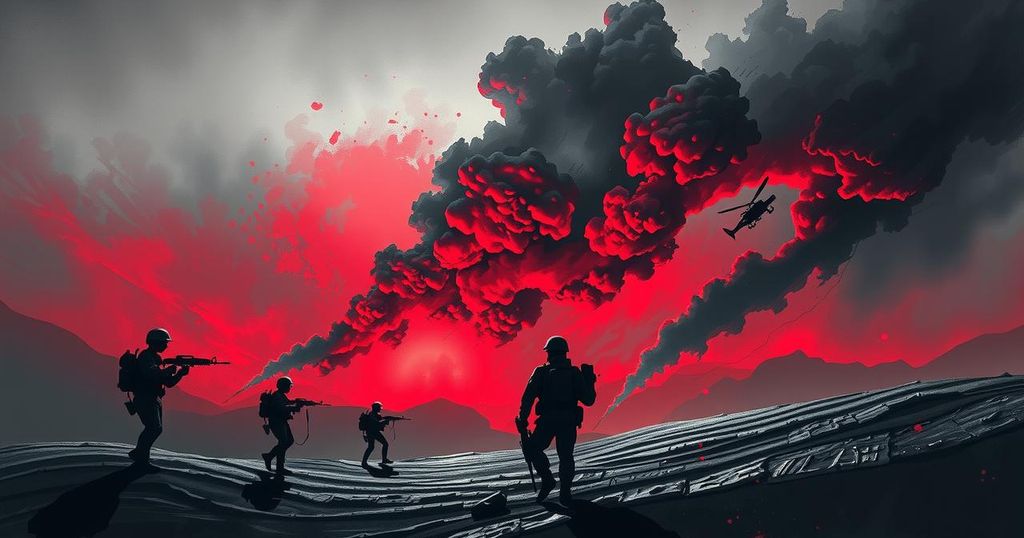Global news
ABBAS ARAGHCHI, ARAGHCHI, ASIA, BEN GURION INTERNATIONAL, BEN GURION INTERNATIONAL AIRPORT, CONFLICT, DONALD TRUMP, GAZA, GAZA STRIP, HAMAS, HEZBOLLAH, IRAN, ISRAEL, MIDDLE EAST, NET, NORTH AMERICA, NUCLEAR POLICY, OMAN, RED SEA, TEHRAN, TRUMP, UNITED STATES, US, WASHINGTON, YEMEN
Isaac Bennett
0 Comments
Iran Accuses Netanyahu of Entangling the U.S. in Middle Eastern Crisis
Iranian Foreign Minister Abbas Araghchi has accused Israeli Prime Minister Netanyahu of dragging the U.S. into Middle Eastern conflicts, particularly in relation to Gaza and the Houthis. Tensions are exacerbated with the postponement of nuclear talks and U.S. support for Israel, while calls for diplomatic solutions from both sides are growing amidst rising hostilities.
The escalating tensions in the Middle East have taken center stage once again, as Iranian Foreign Minister Abbas Araghchi spearheads criticism against Israeli Prime Minister Benjamin Netanyahu. On Monday, Araghchi claimed that Netanyahu is leading the United States towards a “disaster” due to his influence over President Donald Trump’s stance on various regional issues, including the ongoing Gaza conflict and the actions of Iranian-supported Houthi rebels.
Araghchi did not hold back when he stated, “Netanyahu is directly MEDDLING within the US Government to DRAG it into another DISASTER in our region,” cautioning against any potential military aggression towards Iran. His remarks raised alarms about what he perceives as Netanyahu’s efforts to dictate U.S. foreign policy with Iran.
The Iranian minister underscored U.S. involvement in the conflict, particularly pointing to its support of Israel during the war with Hamas, as well as recent American airstrikes targeting the Houthi group in Yemen, which has been launching attacks on Israel. Araghchi criticized these actions, asserting that they do not benefit American interests.
As for Netanyahu, he has been vocal about holding Iran accountable for the activities of the Houthis, especially after a missile strike that targeted Ben Gurion International Airport. Notably, Iran has refuted claims of involvement in that incident.
Meanwhile, the backdrop of this escalating rhetoric is the stalling of crucial nuclear talks between Iran and the United States, which were set to occur this past weekend but were canceled due to “logistical reasons.” Since April, three rounds of discussions have taken place, which represent a significant level of communication since Washington exited the nuclear agreement in 2018 under Trump’s leadership.
In this climate, Netanyahu has reiterated his call for the dismantling of Iran’s nuclear potential, insisting on the importance of eliminating Tehran’s ability to enrich uranium. Trump, in a recent NBC News interview, voiced conditional acceptance of a deal that permits civilian use of nuclear energy, hinting at shifting perspectives in U.S.-Iran relations.
In tandem, Araghchi called for a reassessment of U.S. positions, suggesting that the path to a nuclear accord lies in practical diplomacy. He expressed confidence that a treaty is attainable, provided both sides engage in discussions based on mutual respect and interests. Furthermore, he indicated Tehran’s readiness to resume discussions with European nations that were part of the original 2015 nuclear framework, including France, Germany, and the UK, despite ongoing accusations regarding Iran’s nuclear ambitions.
Ultimately, the unfolding situation remains complex, with statements and counterstatements flying between nations, each holding firm to its own narrative amid fears of an escalating conflict.
In summary, tensions are rising as Iranian Foreign Minister Abbas Araghchi vocally criticizes Prime Minister Benjamin Netanyahu for potentially embroiling the U.S. in regional conflicts. As nuclear talks stall, both parties emphasize the need for diplomacy. Meanwhile, Netanyahu continues to advocate for action against Iran’s nuclear capabilities, amid ongoing hostilities in Gaza and related conflicts in the region. The pathway toward resolution remains fraught, illustrating a complicated geopolitical landscape.
Original Source: www.france24.com




Post Comment